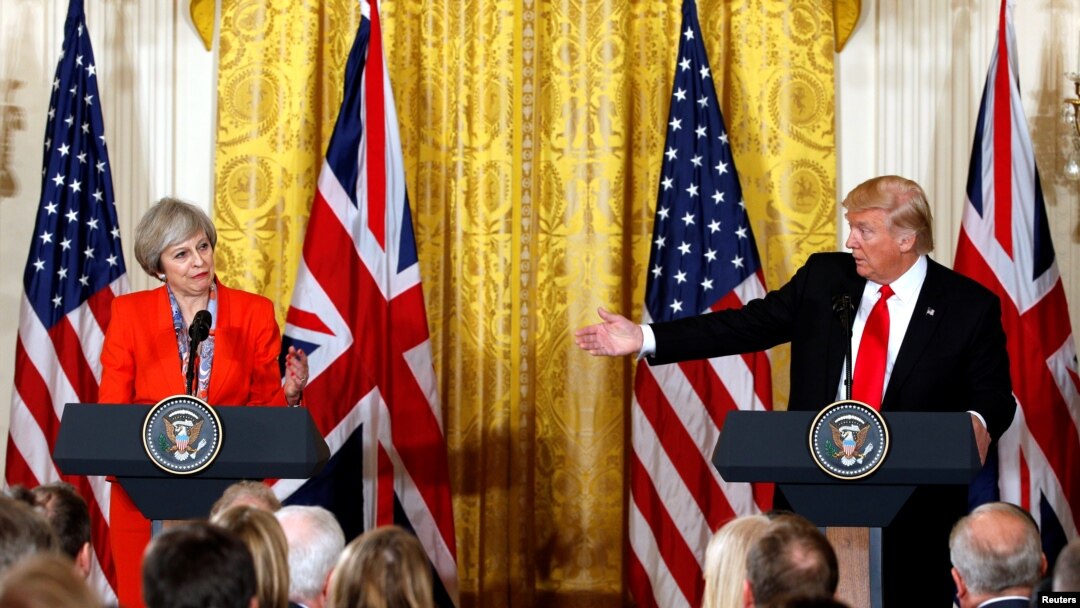In his first meeting with a foreign leader, U.S. President Donald Trump spoke of the two nations' "special relationship," and British Prime Minister Theresa May agreed, mentioning common economic interests and shared values, but pointedly saying the new president had pledged he is "100 percent" behind NATO.
Trump has raised concerns in European capitals with statements that he has made saying NATO is obsolete and that other members need to start paying their share for their own defense.
Watch: Trump Hopeful About Relations with Putin Ahead of Phone Call
Your browser doesn’t support HTML5
Trump Hopeful About Relations with Putin Ahead of Phone Call
At a news conference following the leaders' meeting, Trump said Britain is especially close to his heart because his mother was from Scotland.
"Today the United States renews our deep bond with Britain — military, financial, cultural and political. We have one of the great bonds," said the president. "We pledge our lasting support to this most special relationship. Together America and the United Kingdom are a beacon for prosperity and the rule of law. That is why the United States respects the sovereignty of the British people and their right of self-determination. A free and independent Britain is a blessing to the world and our relationship has never been stronger."
Trump said he strongly supports Britain's "Brexit" vote to pull out of the European Union. "I think Brexit is going to be a wonderful thing for your country," he said.
He added that Britain would be able to reach "free trade deals without somebody watching you and what you are doing."
U.S. relationships
When reporters in the ornate White House East Room questioned the leaders, there were queries about Trump's controversial stands on Mexico and Russia.
When asked whether he would lift sanctions after a planned phone call Saturday with Russian President Vladimir Putin, Trump said it is very early to be talking about sanctions. Trump stressed he "looks to have a great relationship with all countries," mentioning that this includes China.
Answering the same question, May said Britain wants to see sanctions against Russia continued until there is full implementation of the Minsk Agreement — provisions to end the fighting between pro-Russian rebels and Ukraine.
President Donald Trump stands with British Prime Minister Theresa May in the Oval Office of the White House in Washington, Jan. 27, 2017.
NATO
May said one of the most important areas where the two countries are working together is the fight against the Islamic State group. She also surprised some by saying Trump told her he supports NATO, the trans-Atlantic security alliance.
"On defense and security cooperation, we are united in our recognition of NATO as the bulwark of our collective defense and today we've reaffirmed our unshakable commitment to this alliance. Mr. President, I think, you said — confirmed that you're 100 percent behind NATO," said May.
"But we're also discussing the importance of NATO continuing to ensure it is as equipped to fight terrorism and cyber warfare as it is to fight more conventional forms of war," she said. "And I've agreed to continue my efforts to encourage my fellow European leaders to deliver on their commitments, to spend 2 percent of their GDP on defense so that the burden is more fairly shared. It's only by investing properly in our defense that we can ensure we're properly equipped to face our shared challenges together."
Asked about his comments that torture works to fight terrorism, Trump said he does believe that, but he said he would defer to his incoming Secretary of Defense, retired General James Mattis.
WATCH: Trump on enhanced interrogation
Your browser doesn’t support HTML5
Trump on Mattis, Enhanced Interrogation Policy
Trade, U.N. funding
The British Embassy said May presented Trump with a Scottish artifact, a "Quaich,” which is a cup symbolizing welcome and kinship. She also presented a gift for first lady Melania Trump, a "hamper" full of special produce, including marmalade and tarts.
Both Trump and May have taken steps to reform their international relations, particularly through trade. Britain's pending exit from the European Union and Trump's withdrawal from the 12-nation Trans-Pacific Partnership will necessitate negotiating new trade agreements throughout the world.
May's plan for the EU exit includes placing a priority on controlling immigration, although she has not yet announced any policy details.
Earlier, White House spokesman Sean Spicer said Trump has not yet decided whether he will cut funding to international organizations, like the United Nations, after media reports suggested the president was looking to reduce the role of the U.S. within those organizations.
On Thursday, May spoke to a gathering of U.S. Republican leaders in Philadelphia where she said the days of the U.S. and Britain intervening in other nations to remake them in their image are over.
FILE - Britain's Prime Minister Teresa May addressed the 2017 "Congress of Tomorrow" Joint Republican Issues Conference in Philadelphia, Jan. 26, 2017.
May said it is in British and American interests to defend their values, but not go back to what she called the "failed policies of the past. But nor can we afford to stand idly by when the threat is real and when it is in our own interests to intervene. We must be strong, smart and hard-headed."
May also called for reform in such multinational institutions as the U.N. and NATO "to make them more relevant and purposeful."
She said their members have to stop leaning on the United States. "Sovereign countries cannot outsource their security and prosperity to America. And they should not undermine the alliances that keep us strong by failing to step up and play their part."
In Philadelphia on Thursday, May said a Trump presidency can make the U.S. "stronger, greater and more confident," which she said is good for the rest of the world. She underscored that British and American conservatives share the same principles.


